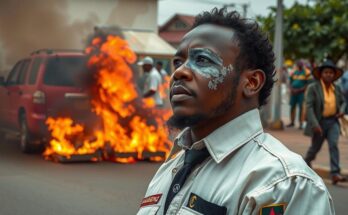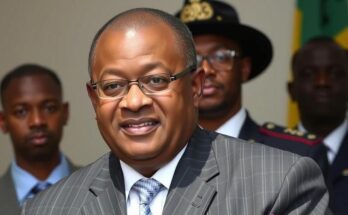Mozambique’s political landscape has been shaped by a history of civil war between Frelimo and Renamo. The 1994 multiparty elections marked a significant peace process, which has since faced challenges of electoral legitimacy and violence. As Mozambique moves toward the 2024 elections, issues of corruption and political tensions persist, amid ongoing economic struggles and insurgency threats, complicating the path to stability and reconciliation.
The conflict between the Mozambique Liberation Front (Frelimo) and the Mozambican National Resistance (Renamo) has significantly shaped the socio-political landscape of Mozambique. Following years of civil warfare, multiparty elections were held in October 1994, marking a pivotal moment in the peace process. The elections witnessed Frelimo making substantial concessions, leading to their participation alongside Renamo and other political organizations. Subsequent political developments led to a series of electoral contests, with Frelimo consistently maintaining its position of power despite allegations of electoral misconduct. The national economy has had a tumultuous journey, experiencing growth alongside setbacks due to natural disasters and civil unrest. As the nation heads toward the 2024 elections, an enduring challenge remains in ensuring legitimate political processes amid ongoing tensions and insurgent threats in certain provinces.
The historical context of Mozambique’s civil war provides essential insight into the evolution of its political framework. Initially a Marxist-Leninist state, Frelimo transitioned towards a multiparty system in the 1990s under President Joaquim Chissano. This transition was facilitated by significant international aid and economic reforms following their participation in the structural-adjustment programs. The emergence of Renamo from a militant group into a political entity reflects a dramatic shift, allowing for greater political participation, albeit amid ongoing struggles for social equality and representation. The founding of the MDM by Daviz Simango indicates a response to perceived dissatisfaction with Frelimo and Renamo, underscoring the emergence of new political dynamics in the region.
The continued political friction between Frelimo and Renamo has manifested in subsequent elections, with accusations of electoral malfeasance leading to significant public discontent. The 2019 elections, while benchmarked by a peace agreement, nonetheless revealed troubling signs of voter intimidation and fraudulent practices. These tensions have further escalated with ongoing insurgencies in northern Mozambique, posing challenges to national stability. The upcoming electoral cycle in 2024 is anticipated to be contentious, particularly with allegations of irregularities already surfacing during the lead-up to the elections and amid a backdrop of violence.
“Renamo had complained of voting intimidation, irregularities, and fraud while the results were still being tabulated” – Source.
The resilience displayed by the Mozambican population in the face of adversity is commendable, yet significant obstacles remain. The political instability and economic disparities continue to perpetuate societal challenges. The urgent need for impartial governance and inclusive political dialogue is evident as Mozambique approaches its future elections. A concerted effort towards ensuring transparent electoral practices is imperative, not only for the respect of democratic principles but also for fostering long-standing peace and reconciliation in the nation.
The civil relations in Mozambique have been shaped by years of conflict primarily between Frelimo, the ruling party, and Renamo, an opposition group that originated from a guerrilla movement. Following the end of the civil war, political reforms initiated in the 1990s under a new constitution allowed for multiparty elections. Despite subsequent electoral progress, tensions between these political entities have continued to rise, particularly as allegations of corruption and manipulation persist. The complex dynamics of Mozambique’s political environment must be understood in relation to the economic struggles that the nation has faced, exhibiting both impressive growth and devastating natural crises. The historical context of this relationship plays a crucial role in contemporary politics, particularly as the country prepares for ongoing electoral challenges and strives for stability.
In summary, Mozambique’s political history is characterized by a tumultuous civil conflict, significant electoral milestones, ongoing corruption scandals, and economic challenges. The interplay between Frelimo and Renamo illustrates a complex and evolving political environment. With the approaching 2024 elections, the need for transparent governance and the preservation of civil liberties remain critical to the nation’s future. As Mozambique seeks to enhance its stability and political integrity, the collective efforts of its people and political institutions will be paramount in navigating both the past and the future.
Original Source: www.britannica.com




